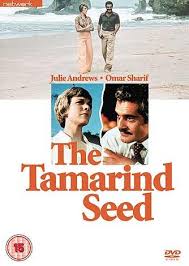
THE TAMARIND SEED
UK, 1974, 125 minutes, Colour.
Julie Andrews, Omar Sharif, Anthony Quayle, Daniel O'Herlihy, Sylvia Sims.
Directed by Blake Edwards.
One does not usually call a spy film nice, but this one is - how otherwise with Julie Andrews as heroine (fully clad, nicely spoken and always at the centre of director-husband Blake Edwards' attention)? Omar Sharif is nice too, as a Russian spy. It's the kind of film a reviewer is not supposed to like - long lush widescreen photography, Barbados, Paris, London, romance, some cliches. But it is a very enjoyable film. All the foregoing ingredients support an interesting plot and some suspense. Solid acting support comes from Anthony Quayle, Sylvia Syms and Dan O'Herlihy. It may or may not be real, but it is pleasant and competent entertainment.
1. The significance of the title and its use. the seed itself, the legend, the hero being burnt under the tree, its allegorical fulfilment? Did this add to the atmosphere of the film?
2. Was this a good spy story? A successful romantic spy story? The impact of the stars and the film being built around them? Designed for popular consumption? How successful on this level was it? What values did it stand for? How seriously was it meant to be taken?
3. The design of the credits, the use of colour, the accident, the photography throughout the film, locations, the song and the music? How effective?
4. The importance of Julie Andrews for this film? The focus of attention on her, the camera on her continually, her personality and style, too prim or successful? The impact of her walk along the beach and her memories, her affair and the regrets, her memories of her husband, her job and her dedication to this? How attractive a heroine, audience sharing her plight, her involvement with the Russian, her growing in love? The audience sharing her danger, her suffering? Was the film successful in engrossing the audience in Judith Farrow's life?
5. How important was the theme of patriotism in the film? To Britain. to Russia? Any insights into spying and relationships between East and West? The manipulation by authorities of ordinary people? The lack of privacy etc.? What attitude did the film take to this?
6. How important was the personality of Omar Sharif for the film? Was he convincing as a Russian? The nature of his disillusionment with Russia, his loyalty to Russia, to his wife, to his work? Why was he suspect? Why did he fall in love with Judith Farrow? Did he intend to recruit her? Why did he become involved in the double-game? Did the film show the dangers to him convincingly? His being followed in London, his taking of the file. the nature of his escape, the threat to his life in the Barbados?
7. How did the film convincingly show the workings of international spying: the use of others, the techniques for intruding into privacy, the nature of blackmail, the use of information to threaten other people's lives etc.?
8. How interesting a character was Jack Loder - as a person, his work. his dedication to his work, his shrewdness. his help in getting Svirdlov out?
9. The irony of Stevenson and his wife, was this convincing? The quality of their marriage and mutual fighting, infidelities? The fact that Stevenson was a traitor? The manipulation that he went on with? His techniques? The threats of his wife and her using the information for her career? The irony at the end; that this would not be fulfilled?
10. Comment on the presentation of the British and Russian personnel in the embassies and their various assignments, need for security, loyalty etc.
11. Did the film generate adequate suspense? Judith's phone calls, being followed, her helping of him, the flights, the relaxation at Barbados, the bomb, thinking Svirdlov dead, the ending?
12. How satisfying was the suspense with the escape, the pursuit by boat of the assassins etc.?
13. How satisfying as entertainment was this? How successful in the spy genre?